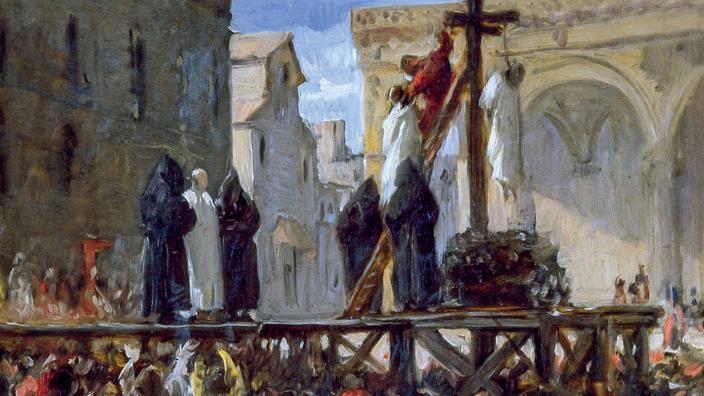On the night of April 5, 1492, lightning struck with an end-of-the-world crash.
The gigantic dome of the cathedral, an architectural feat and pride of the Florentines, drew lightning.
At the same moment, the prior of San Marco, Jerome Savonarola, had a new vision: an immense sword in the sky above the city, the army of angels on the march, the forthcoming punishment for the ungodly.
Read alsoBotticelli, itinerary of a child prodigy: at the origin of genius
In his villa in Careggi, bedridden, sick, Laurent the Magnificent reads the anger of heaven the announcement of his death. Three days later, he died, leaving Florence on her own. Pierre de Medici, like his father in the past, inherited power at the age of twenty. But he has neither the charisma nor the cunning of his ancestors. Unable to reassure the population of the Tuscan city upset by the apocalyptic sermons of Savonarola, he himself gives in to terror when the Dominican preacher prophesies that barbarians will devastate Italy.
In September 1494, the King of France Charles VIII set out to conquer the kingdom of Naples. Faced with this invasion, which seems to confirm the monk's predictions, Pierre loses all temper. On November 9, he fled. The Medici lost Florence. Botticelli feels like he's having a bad dream. Death, Laurent. Death, Politian. Death, Pic de la Mirandole. Fainted, the glory of Florence. Gone, all his friends. Sandro has a hard time pushing back the idea that everyone in Careggi has attracted divine punishment. Without his keen sense of the ridiculous which suddenly seems to be lacking in the rest of the Florentines, he too, perhaps, would swell the ranks of the crowds that flock to hear Savonarola.
No need, moreover, to move: his brother Simone, returned from Naples at the announcement of the French invasion, recounts to him the smallest frowns of the dark prophet. Throughout his sermon, he cried out his hatred of the Medici, of the “
brigands
” and of the “
demons
”, he predicted a glorious destiny for the city, swore that Rome was nothing more than Babylon, the Pope, an Antichrist. We must repent, reject all wealth, return to the simplicity that befits the disciples of Christ.
Sandro has something to be seduced: he has few illusions about Rome, where the Borgias now reign; as for the consciousness of sin, it has tormented him for a long time. When Savonarola, who had gone on an embassy to Charles VIII, managed on November 28 to avoid the sacking of Florence, he was on the verge of joining the people who acclaimed him. Only his unwavering loyalty to the Medici and his reluctance to howl with wolves hold him back. He hardly appreciates, in fact, the partisans of the Dominican, young fanatics recruited, just as quick to anathema as to denouncing.
On February 7, 1497, those nicknamed the piagnoni, the “
whiners
”, set up an immense pyre of vanities. We throw in a jumble of wigs, adornments, perfumes and the exquisite dresses of Sandro's nymphs. Books, viols and lutes are stacked there. Lorenzo di Credi, once his friend in Verrocchio's studio, places his own paintings there himself. When Savonarola is excommunicated by Pope Alexander VI, tired of being constantly the target of his attacks, Simone begs her brother to sign the petition for the lifting of the sentence. Botticelli refuses. He has just completed a fresco for Lorenzo di Pierfrancesco. Another is waiting, in the Ognissanti church. Like every day, he will paint. It is his way of resisting.
However, within a few weeks, the tide turns.
The French threat passed, Savonarola wasted no time in alienating the great families he had wanted to remove from power.
And the crowd is changeable.
On April 8, 1498, she turned with violence against the one she adored.
San Marco is taken by storm.
Savonarola, arrested, is savagely tortured.
He is forced to confess that his revelations did not come from God.
On May 23, he was hanged.
After having burned his body, his ashes are finally dispersed in the Arno, as if to be certain that nothing will remain of him.
Wasted effort.
The spirits are marked by the iron of his prophecies.
Botticelli, all the beauty in the world, € 12.90 on Figaro Store
Cover of the Figaro Hors-Série dedicated to Botticelli
La Belle Simonetta, Botticelli, 1485 (Städel Museum)

